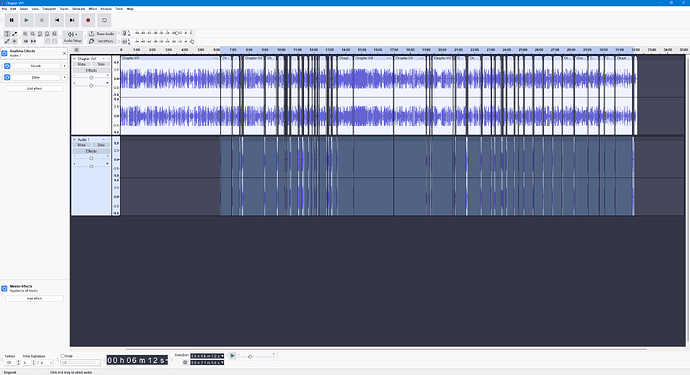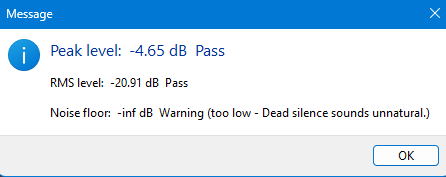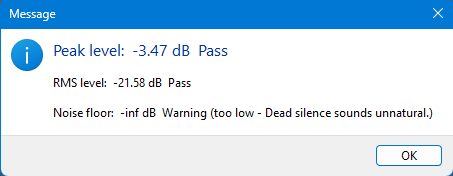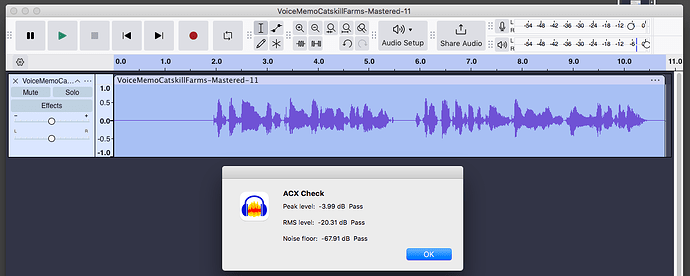I’m working on an audiobook, where the bottom track is a char who speaks in telepathy. I added the effects on the right to add an effect akin to mental speaking. Currently using acx check, the top one passes. The bottom track also passes, but together ACX shows that the peaks are at 0 and need to be adjusted.
I can’t seem to shift peaks with amplification without messing up RMS (too loud), using a limiter messes up both, and if peaks passes, rms fails and vice versa. I’ve gone through each number from -3–(-4.9) on peaks, and from -18-(-23) on RMS and neither are playing well.
It SOUNDS fine, no issues with peaking, silence, buzzing, or the like, but the automatic checking doesn’t like the complete file. I’m at a loss for what to do because this plagues all chapters with this character. I don’t wanna reverse the effect, as it’s integral to the story, but DAMN is this frustrating when I’m so close to publishing.
I even re-recorded each line in the bottom track, ran the macro on each line to make sure all of them passed acx check, and with both tracks passing (below) it still has 0db peaks when uploading it to ACXlab (document attached). I’m losing my mind and am in the final stages of editing and this plagues at least 12 chapters.
ACXLAB output for whole file

Track 1
Track 2
Macro Settings
I could use some help.
I even re-recorded each line in the bottom track, ran the macro on each line to make sure all of them passed acx check,
What do you mean by “line”? You need to run the macro on the almost-complete file as the last step before compressing to MP3.
You shouldn’t be getting a difference in peak measurements. Are you checking the exact same files, after encoding to MP3, etc.?
Make sure to run ACX Check on the MP3.
MP3 compression changes the wave shape so some peaks can get somewhat higher but usually it’s less than 1dB of difference.
Sometimes you’ll get slightly different RMS calculations because you can’t practically calculate the RMS on on the whole file. It has to be chopped-up and nobody knows exactly how ACX does it
They will also reject you for dead silence. Either you added pure-digital silence or you use “excessive” noise reduction or noise gating.
That “overprocessing” should be avoided but you can generate some noise around -65 or -75dB (0.0005 amplitude) and mix it in. (Brownian noise is probably best because it’s harder to hear but should still measure “bad enough to pass”.)
ACX is probably measuring the average or RMS noise level so it may be lower than the (peak) amplitude you set in Generate.
I mean that each little bit of audio on the 2nd track is a specific character’s lines. I’ll pull the extracted audio file back into audacity and run a check on that. Looking at it now, I see that when compressing to an mp3 file, it merged both tracks into one. Now as a single file, all audio effects included, it passes the acx check. Uploading it back to acx and…
It worked!!!
Alright. So then my production my process should include opening the exported mp3 back into audacity, running the mastery and checks on that file, and then having ACX check the file after I re-export it with the compressed and encoded mp3. This is only a problem on files that use more than one track, which I usually do when I need to add audio effects to a specific character’s voice.
I wasn’t checking after encoding to mp3, just opening up the aup3 file and being really confused. I will likely still re-record the lines in other chapters as some are over-processed, but this appears to have solved my issue. Thank you so much!!
A couple of notes. You should ignore MP3 until the final step where you submit. One of the ACX specifications for submission is that your MP3 must have a Quality of 192 Constant, or higher. If you make an MP3 from an MP3, the quality goes down in unpredictable ways—and you can’t stop it. I see ACX actually checks MP3 submission quality now. They didn’t used to.
Production should be in WAV or other perfect quality format and, as above, only create the MP3 as a last step. Also, your Archive Edit Master should be a perfect WAV or equivalent. Not MP3.
Have you submitted before? The Audiobook concept is someone telling you a fascinating story over cups of tea. Not a broad theatrical production or mixed podcast.
They also prefer mono over stereo. This is a submission sample I generated.
Yes, it does pass ACX-Check (attached) and ACXLab.
You can try submitting a multi-performer theatrical production with effects and music, but that used to be forbidden, even if you did pass all the technical standards.
This is a cousin to another problem. They hate distracting effects and distortion. I see you already ran into the problem of over-applying Noise Reduction.
I would try mixing the production down to two-channel stereo or, even better, one channel mono, apply 36Mastering, check it, convert to MP3 and submit.
Post back how it goes.
Koz
In going back over my notes, I think FLAC is the alternative to WAV format. WAV is uncompressed and FLAC is “Lossless.”
I’m checking that.
Also I’m reminded why they don’t much like music. Remember, it’s a business. Be prepared to present all the copyrights and ownership of your tunes.
Koz
I’ve gotten it to pass, and I’ve done two full books before. This is the first time adding effects so it’s an extra layer of mastering to get through. I’ll keep the WAV format in mind for the future, and I’ve done mono for previous works!
For effects, I’m only wanting an echo effect to differentiate mental speech from a character, from their eventual normal speech. previously I would simply speak quieter and closer to the microphone for the illusion of closeness. I got approval from the author for adding an effect that helps things be more distinct. I’m still finding I need to re-record the character’s lines, but I will export in FLAC or WAV, so that audacity merges tracks, then master it in a new aup3 file, and export as mp3. a pain, but a more thorough method that I may adopt moving forward should I do anything like this again!
Works for me.
A note on 36Mastering. It doesn’t adjust volume as the performance progresses. It picks one value and applies it over the whole chapter. It was designed for one person reading a chapter with quality control headphones and an even voice.
Koz





